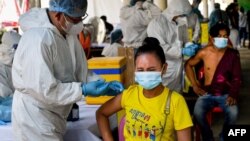Health officials were monitoring the effectiveness of the vaccination program in Phnom Penh – where more than 99 percent of adults are vaccinated – as the drive now enters the provinces, a Health Ministry spokesperson said.
Health Ministry Secretary of State Or Vandine told VOA Khmer that vaccines used in Cambodia’s mass vaccination drive – Sinovac, Sinopharm and AstraZeneca – were effective in preventing severe illness and death, and that fully vaccinated people still needed to observe COVID-19 measures, like mask wearing and social distancing.
“We need to wait and see to what degree the vaccines will create herd immunity in the community and in the capital city of Phnom Penh,” Or Vandine said. The senior health official did not elaborate on how this would be monitored.
“We are observing constant and subsequent reports on deaths. But according to the information I have, a majority of the fatalities have been people in the provinces who have not been vaccinated,” the spokesperson said.
The recent spike in COVID-19 deaths had caused a backlog at the city’s crematoriums, said Deputy Municipal Governor Keut Chhe, and that around 50 bodies were yet to be cremated. Cambodia has reported more than 900 daily cases for the last two weeks, with a significant increase in deaths from the disease.
Around five million people had been given at least one dose of a vaccine as of Tuesday, with 1.7 million people fully vaccinated in Phnom Penh.
Dr. Ouch Wuthy, who heads the Cambodian Virtue Medical Association, said the government should consider diversifying the types of “high-quality” vaccines on offer and routinely study vaccinated individuals to measure the effectiveness of these vaccines.
“We need to know if the vaccines will trigger an antibody response in the bodies of the vaccinated people so that we can understand the illness and fatality risks of those individuals against the virus,” Ouch Wuthy told VOA Khmer.
“So, it is wise to monitor and study vaccinated people every three or six months whether the vaccines are effective,” he added.
Countries in the region have expressed separate concern over lower efficacy rates seen with the Sinovac vaccine, especially given the emergence of new and deadlier variants of the virus. In Thailand, the Ministry of Public Health has started giving AstraZeneca vaccines to those who have already got their first shot of Sinovac.
The World Health Organization, however, warned against mixing vaccines on Monday.
"It's a little bit of a dangerous trend here. We are in a data-free, evidence-free zone as far as mix and match," WHO’s chief scientist Soumya Swaminathan said according to Reuters.
Cambodia will also receive around one million doses of AstraZeneca vaccine donated by Japan through the global vaccine-sharing scheme COVAX, according to a statement released by the Japanese Embassy on Tuesday.
"This was decided in light of the friendship between Japan and Cambodia and based on the current status of COVID-19 in Cambodia," Japanese Ambassador Mikami Masahiro was quoted as saying in a statement.
Cambodia previously received 324,000 doses of AstraZeneca vaccines made by India’s Serum Institute and shipped through the COVAX program in March. But scheduled COVAX shipments consequently were blocked by India after a tragic second wave in the country that killed thousands of people every day.







